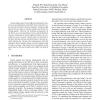Free Online Productivity Tools
i2Speak
i2Symbol
i2OCR
iTex2Img
iWeb2Print
iWeb2Shot
i2Type
iPdf2Split
iPdf2Merge
i2Bopomofo
i2Arabic
i2Style
i2Image
i2PDF
iLatex2Rtf
Sci2ools
IEEECIT
2007
IEEE
2007
IEEE
Worrisome Rich-Get-Richer? Not the True Story!
Search engines have become efficient assistants for people to access information on the Web. Some researchers argue that the prevalence of search engines is setting a tough journey for new pages to become popular even if they are of high quality. However, the evolution of popularity on the Web is not a closed feedback process, and the flexibility of query mechanism of search engines provides a free interface for users to search whatever they are interested in. We show that the diversity and drift of users’ interests actually alleviate the rich-get-richer phenomenon which the popularity-based ranking strategy of search engines tends to make worrisome. The results of our experiments on the query log of a real search engine also confirm our point of view.
Closed Feedback Process | IEEECIT 2007 | Information Technology | Real Search Engine | Search Engine |
| Added | 03 Jun 2010 |
| Updated | 03 Jun 2010 |
| Type | Conference |
| Year | 2007 |
| Where | IEEECIT |
| Authors | Mingda Wu, Qiancheng Jiang, Yan Zhang |
Comments (0)

